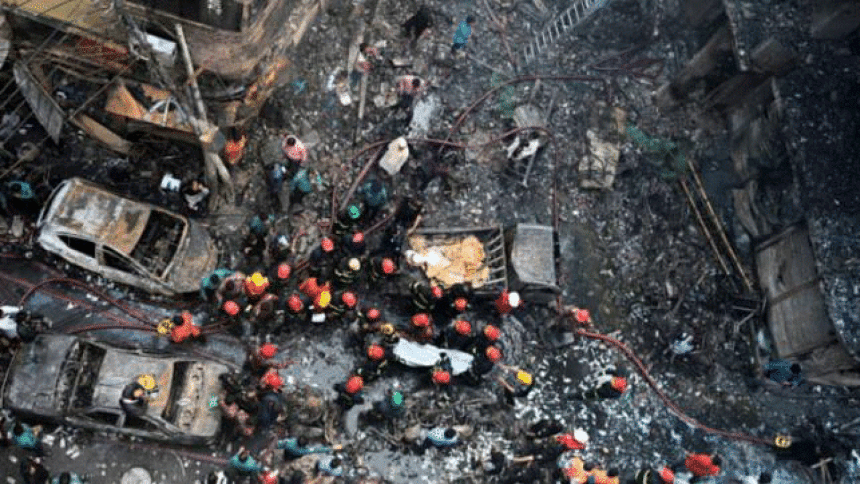No, Chawkbazar fire won't be our 'wakeup call'

Yet another tragedy has struck Bangladesh. Suddenly, everyone has woken up to the danger of chemical factories in Old Dhaka which this daily, along with other newspapers, has been crying hoarse over for years since the Nimtoli fire claimed more than 100 lives in 2010. Suddenly, we see ministers rushing to Chawkbazar "concerned" about the menace of chemical warehouses housed in residential buildings, as if eight years wasn't enough to make these factories close shop or relocate elsewhere.
If anyone deserves praise and recognition, it's all those firefighters who, despite all obstacles, fought relentlessly for 14 long hours to contain the fire which had turned the place into a scene straight out of a dystopian novel.
Despite what we'd like to believe, the Chawkbazar fire isn't going to be our "wakeup call". Things will go on business as usual once public outcry dies down in a few days, or weeks, and the probe body (our favourite thing to do is to set up a "probe body" after any untoward incident or accident) makes "recommendations" which will never see the light of day, rest assured. One wonders why the industry ministry is going through the futile exercise of setting up a committee tasked with "assessing the extent of losses and making recommendations to prevent the recurrence of such an incident." Because after the Nimtoli fire, yet another committee had made recommendations that warehouses be moved to non-residential areas, and that the Fire Prevention and Extinguishing Rules 2003 and Bangladesh National Building Code be enforced, among other things. None of that ever happened.
Nothing changed after Nimtoli. And there's simply no reason to believe anything will change now even though the horror that we saw unfold beginning Wednesday night is one of the deadliest fire outbreaks in the country's history.
This is the result—and will continue to be so—of letting power, corruption and an attitude of profit-at-any-cost run amok. This is why disasters like Rana Plaza and the Chawkbazar fire are anything but "shocking". These catastrophes were in the making for a long, long time.
It has now pretty much been established that regardless of the origin of the fire, flammable perfumes and cosmetics that were stored in a warehouse of the second floor of the building caused the fire to spread. And to think that there are more than 25,000 chemical warehouses in Old Dhaka, of which 15,000 are in residential buildings and only two percent have permission from the city corporation, is beyond disturbing. Knowing full well the consequences of a fire outbreak in any of these structures in a tightly-packed place like Old Dhaka where 265 to 1,100 people live per acre, the city authorities have willingly turned a blind eye to these factories—lured to old town by the prospect of cheaper rent—operating illegally for God knows how long. Even though the law categorically bars commercial organisations from occupying residential buildings, how is it that thousands of chemical warehouses have so easily set up shop and continued to conduct business uninterruptedly? It is hard to believe that none of the government agencies or ministries had any idea whatsoever about the existence of these illegal businesses. Were the city corporation and fire service and civil defence department—both of which are supposed to issue licences to chemical factories—oblivious to this fact? Are our government bodies so disempowered in the face of these chemical factories/death traps?
The Chawkbazar fire has put the spotlight squarely on illegal chemical warehouses in Old Dhaka, for obvious reasons. But it shouldn't mask the other violations happening in plain sight. For example, what about the fact that most of the 24,000 structures in the 11 wards of Old Dhaka have been built without Rajuk's approval? A total disregard for proper urban planning coupled with corruption and bribery have made it impossible to ensure building oversight; money can buy building permits and a horde of other things. The mindless construction of buildings one after the other without any regard for the Bangladesh National Building Code or zoning laws and illegal shops and stands have turned this historic town into an ugly concrete jungle with no room to breathe, making it extremely hard for any rescue team or firefighting operation to do its job in case of an emergency.
How many buildings in the area, or even in the capital as a whole, adhere to the "Fire Drill and Evacuation Procedure" of the Bangladesh National Building Code which states that "Each and every building shall have an emergency evacuation protocol, first aid firefighting plan, training and responsibilities of the occupants complemented with the provisions provided therein"? Maybe it's wishful thinking but could this have saved more precious lives on that fateful night in Hazi Wahed Mansion, the four-storey building engulfed by the destructive fire in Chawkbazar, had this procedure been in place?
A national habit of making elaborate laws but never enforcing them has proven to be very costly (and these chemical factories and in many cases even the buildings they occupy have violated every law in the book), but there is no reason to believe that the Chawkbazar fire will turn things around and make our stubborn attitude of valuing profit over human lives go away. After some time passes, it'll be business as usual.
Nahela Nowshin is a member of the editorial team at The Daily Star.





Comments